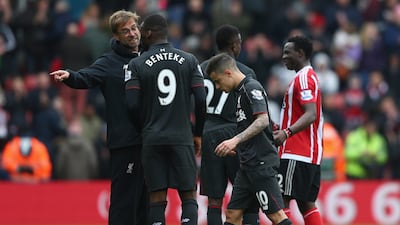Crystal Palace. The very mention of them is enough to make some Liverpool fans shudder.
If it was not the “Crystanbul” game in 2014 when Palace came back from 3-0 down to end Liverpool’s Premier League title hopes, it was the way Alan Pardew’s party-pooping team ruined Steven Gerrard’s last match at Anfield.
Now comes the possibility of a hat-trick of sorts. Christian Benteke’s presence in the Palace forward line on Saturday night, allied to the immutable law of the ex and Liverpool’s propensity to concede from set-pieces, indicates the forward they discarded has the potential to be decisive.
Much of goalscoring is based on timing and positioning. Benteke found himself at Anfield at the wrong time, at odds with a philosophy being implemented.
The temptation is to say Benteke failed at Liverpool. He averaged a league goal every 168 minutes — the sort of statistic that would have rendered him a first choice elsewhere — but he certainly failed to establish himself in Jurgen Klopp’s preferred team.
More from our coverage of European football weekend
Thomas Woods: The Big Weekend Preview is here and now
Greg Lea: Kane still cannot come soon enough for Spurs
“When I signed there was another coach and with him it might have turned out differently,” he said phlegmatically in August.
But by his own admission, Benteke was “fighting a losing battle” from the moment Klopp was appointed. The sense that he is not Klopp’s style of striker has been illustrated by the man who is: Roberto Firmino is more false nine than traditional target man.
His incessant running creates space for others. He is the selfless sprinter who has ousted another traditional striker, Daniel Sturridge, partly because he is the first line of defence in the pressing game.
A clash of styles will be apparent in the forward lines. Benteke and Firmino are tied on three league goals apiece, but with contrasting contributions. Pardew wants a focal point to his attack, Klopp a blur of constant movement. Through no fault of his own, Benteke became emblematic of confused thinking at Anfield.
In the spring of 2015, Brendan Rodgers felt he was not the same player after injury. A goalscoring run for Aston Villa later, he had surged to the top of the manager’s summer shopping list. Liverpool have had a habit of paying a lot for players in recent years and they ended up activating his £32.5 million (Dh145.3m) release clause.
The manager who signed him was dismissed six weeks into the season, leaving Benteke an expensive substitute soon after Klopp’s arrival when, surely, they would have been better holding on to the money and allowing the incoming manager to spend it.
And yet, such is the inflationary nature of the transfer market, Liverpool almost broke even on Benteke. Escalating prices, courtesy of a new television deal, meant Palace could afford to pay £27m for him. But, while Benteke conceded he struggled mentally as a bit-part player, his exemplary attitude in training also allowed Liverpool to command a premium price.
This was not a case — unlike Mario Balotelli, say — of them cutting their losses to get rid of one who was perceived as a liability. That professionalism means many at Anfield will wish him well. Just not on Saturday.
Because there were times when he showed a rare ability. It seemed to sum up his time at Anfield, too, that even when he scored in spectacular style in one of the calendar’s most famous fixtures, it is not even the most memorable goal of the game.
His overhead kick against Manchester United at Old Trafford was magnificent, but the narrative of Anthony Martial’s Thierry Henry-esque debut goal took over.
That was the Benteke of Liverpool: overshadowed and displaced. He is the pivotal figure for Palace. His past goalscoring exploits against Liverpool indicate they have reasons to be worried.
Follow us on Twitter @NatSportUAE
Like us on Facebook at facebook.com/TheNationalSport


